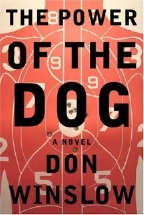The Power of the Dog
Don Winslow
Alfred A.Knopf/ Random House
US Hardcover First
ISBN: 0-375-40538-0
$25.95; 560 Pages
Publication Date: April 26, 2005
Date Reviewed: June 28, 2005
Reviewed by: Terry D'Auray

REFERENCES
COLUMNS
|
|
|
The Power of the DogDon WinslowAlfred A.Knopf/ Random HouseUS Hardcover FirstISBN: 0-375-40538-0$25.95; 560 PagesPublication Date: April 26, 2005Date Reviewed: June 28, 2005Reviewed by: Terry D'Auray |
|
|
REFERENCES |
COLUMNS |
Winslow is a relatively unheralded writer of compelling contemporary crime fiction with an uncommon breadth of style and subject. Beginning in 1991 with the likeable and witty/silly Neal Carey mystery capers, Winslow upped his profile and darkened his themes with the 1998 book 'The Death and Life of Bobby Z" about drug-dealers in Southern California, and turned to arson and surfing with the great 'California Fire & Life' in 1999. And now, some six years later, Winslow's back with an immersive fictional epic about America's war on drugs that spans some thirty years – from the early 1970s to the late 90s. It's a sweeping tour de force blending the personal and the political into a compellingly readable, fast-paced page-turner that packs a knock-out punch.
America's War on Drugs was (and certainly still is) conducted with an irrepressible American arrogance that masked a duplicitous and dangerous hidden political agenda by the DEA, FBI, CIA and any number of self-serving politicos concerned with lining their pockets while burying their heads. The end result of this war is evident on our streets – a steady well-supplied stream of crack cocaine, heroin, and other drugs supplied by the Columbians and expedited by the Mexicans across the miles of US/Mexico border. With the help (unwitting on the part of some, but quite deliberate on the part of others) of the Americans, the Mexican drug biz transitioned from entrepreneurial locally-powerful heroin growers in the 70s to the well-organized, tightly controlled, and highly profitable "federation" of drug transporters of the 90s. It's a classically American corporate growth path that begets vast sums of money concentrated in the hands of a few hugely powerful overlords who then use it to buy the influence of politicians and law enforcement to ensure it all keeps running smoothly. Certainly not a new story, but one that Winslow tells particularly well.
'The Power of the Dog' is 'Apocalypse Now' set in Mexico and Columbia instead of Vietnam, (where many of its participants got their start) with the same crazy, crazed and cruel cast of players, leaders, lords and lookers-on. Winslow rounds up all the usual suspects in any story about illegal drugs - Italian mobsters, Irish mobsters, exceptionally beautiful and expensive hookers, corrupt cops and politicians – and spices the mix with priests and politics in a story that spans the globe from the U.S. to Mexico, from Columbian cocaine cartels to the Catholic Church, from Latin American Marxists to Hong Kong arms dealers.
Yet for all its vastness of time and locale, 'The Power of the Dog' is also an involving personal story anchored by Art Keller, a half-Hispanic DEA agent with a moral compass that usually (but not always) bears true, and an overriding obsession for vengeance. Keller plays the anti drug game hard-heartedly and hard-headedly, seeking the big win no matter what he must lose on the way. Opposite Keller is the Barrera family, father Miguel and brothers Raul and Adan, who control the Mexican drug trade – they build it, grow it, and then re-invent it – with equal parts cunning and cruelty. As the narrative begins, Keller and Barrera swirl amidst a number of well-drawn characters in a complicated and convoluted reality; as the story progresses, it becomes evermore focused on the mano a mano conflict, Keller versus Barrera.
'The Power of the Dog' is a violent book, from its stomach-turning opening chapter to its edge-of-the-seat conclusion. It is a story of drugs and money and power, empires built on fear and death. Those who own the drugs, the money and the power will do anything to keep it – kill a competitor, kill a competitor's family, burn a village – the grander and more gruesome the gesture, the more powerful its deterring impact. The minions who serve the drug lords fear reprisal; the politicos who benefit from the drug lords' beneficence fear exposure. Both reprisal and exposure end most often in an ugly and tortuous death. To succeed in this world is not just to expect violence but to relish it.
The violence in 'The Power of the Dog' is not gratuitous and certainly not unbelievable. It is described dispassionately but quite graphically, with searing images that accentuate the underlying horror. Readers will likely need to take a breather or two as they progress through the pages.
With energetic prose and shifting points of view, Winslow holds this sprawling saga together. His complex plotting and believable characters arc through the great themes of conflict – greed, corruption, cruelty, betrayal, vengeance – to deliver both a clear political exposé and a controlled and compelling story of politics and crime.